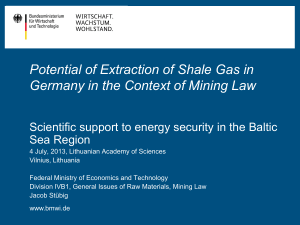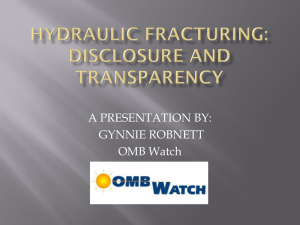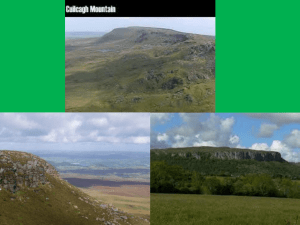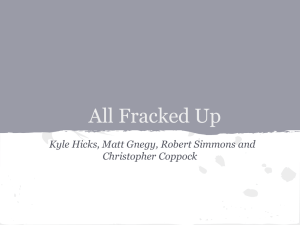Report Stage briefing: Infrastructure Bill
advertisement
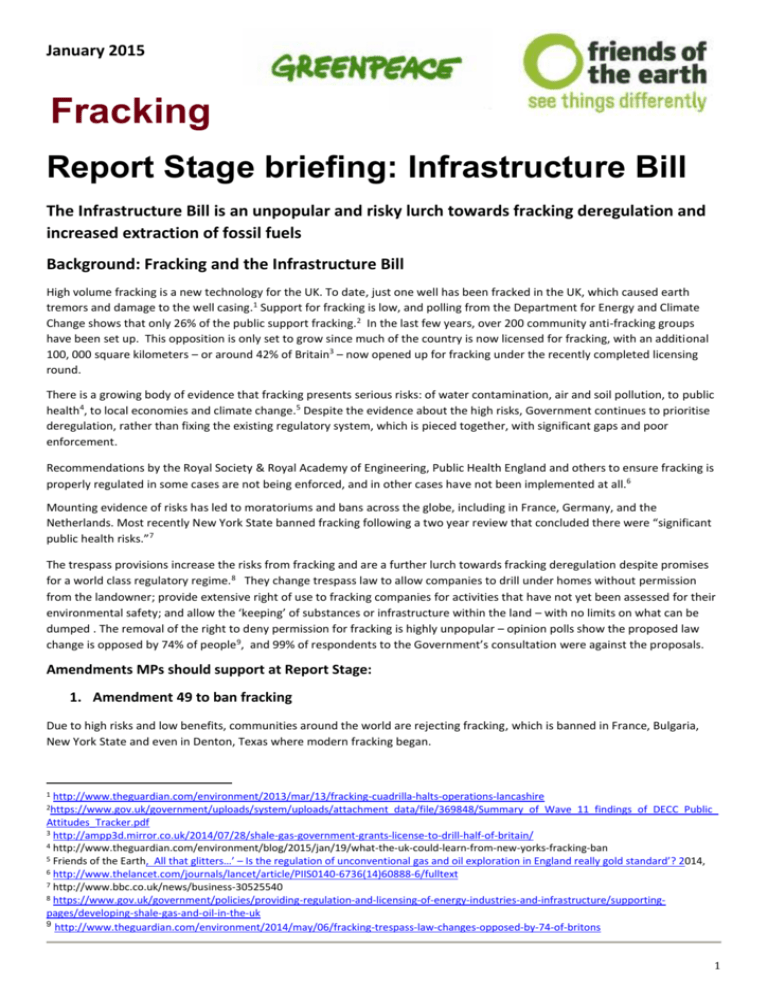
January 2015 Fracking Report Stage briefing: Infrastructure Bill The Infrastructure Bill is an unpopular and risky lurch towards fracking deregulation and increased extraction of fossil fuels Background: Fracking and the Infrastructure Bill High volume fracking is a new technology for the UK. To date, just one well has been fracked in the UK, which caused earth tremors and damage to the well casing.1 Support for fracking is low, and polling from the Department for Energy and Climate Change shows that only 26% of the public support fracking.2 In the last few years, over 200 community anti-fracking groups have been set up. This opposition is only set to grow since much of the country is now licensed for fracking, with an additional 100, 000 square kilometers – or around 42% of Britain3 – now opened up for fracking under the recently completed licensing round. There is a growing body of evidence that fracking presents serious risks: of water contamination, air and soil pollution, to public health4, to local economies and climate change.5 Despite the evidence about the high risks, Government continues to prioritise deregulation, rather than fixing the existing regulatory system, which is pieced together, with significant gaps and poor enforcement. Recommendations by the Royal Society & Royal Academy of Engineering, Public Health England and others to ensure fracking is properly regulated in some cases are not being enforced, and in other cases have not been implemented at all.6 Mounting evidence of risks has led to moratoriums and bans across the globe, including in France, Germany, and the Netherlands. Most recently New York State banned fracking following a two year review that concluded there were “significant public health risks.”7 The trespass provisions increase the risks from fracking and are a further lurch towards fracking deregulation despite promises for a world class regulatory regime. 8 They change trespass law to allow companies to drill under homes without permission from the landowner; provide extensive right of use to fracking companies for activities that have not yet been assessed for their environmental safety; and allow the ‘keeping’ of substances or infrastructure within the land – with no limits on what can be dumped . The removal of the right to deny permission for fracking is highly unpopular – opinion polls show the proposed law change is opposed by 74% of people9, and 99% of respondents to the Government’s consultation were against the proposals. Amendments MPs should support at Report Stage: 1. Amendment 49 to ban fracking Due to high risks and low benefits, communities around the world are rejecting fracking, which is banned in France, Bulgaria, New York State and even in Denton, Texas where modern fracking began. 1 http://www.theguardian.com/environment/2013/mar/13/fracking-cuadrilla-halts-operations-lancashire 2https://www.gov.uk/government/uploads/system/uploads/attachment_data/file/369848/Summary_of_Wave_11_findings_of_DECC_Public_ Attitudes_Tracker.pdf 3 http://ampp3d.mirror.co.uk/2014/07/28/shale-gas-government-grants-license-to-drill-half-of-britain/ 4 http://www.theguardian.com/environment/blog/2015/jan/19/what-the-uk-could-learn-from-new-yorks-fracking-ban 5 Friends of the Earth, All that glitters…’ – Is the regulation of unconventional gas and oil exploration in England really gold standard’? 2014, 6 http://www.thelancet.com/journals/lancet/article/PIIS0140-6736(14)60888-6/fulltext 7 http://www.bbc.co.uk/news/business-30525540 8 https://www.gov.uk/government/policies/providing-regulation-and-licensing-of-energy-industries-and-infrastructure/supportingpages/developing-shale-gas-and-oil-in-the-uk 9 http://www.theguardian.com/environment/2014/may/06/fracking-trespass-law-changes-opposed-by-74-of-britons 1 Fracking in the UK is incompatible with avoiding dangerous climate change. There is agreement – from the International Energy Agency to politicians including Barack Obama, and fossil fuel companies – that most of the world’s proven fossil fuel reserves (not including UK shale gas) cannot be burnt if we are to avoid dangerous climate change. In the absence of a legally binding global climate change deal, there is no constraint on global fossil fuel demand and increased extraction in the UK simply adds to the stockpile of fossil fuels that can’t be burnt. The former Chief Scientific Advisor at DECC, Professor David MacKay stated that “In the absence of global climate policies, we believe it is credible that shale-gas use would increase both short-term and longterm emissions rates.”10 There is already evidence that extraction of shale gas results in fossil fuels being exported and burnt elsewhere. This is happening in the USA, where shale gas contributed to millions of tonnes of unused coal being exported, significantly reducing carbon savings made.11 2. Amendments that introduce a fracking moratorium If MPs are unwilling to support a permanent ban on fracking, this amendment at least allows time for the impacts of fracking to be fully assessed before exposing communities to known – and unknown - risks. This follows the approach taken in the Netherlands and Germany. Most recently, New York State introduced a moratorium while the risks of fracking were assessed. Following a two year review by the New York State Department of Health, it was concluded that fracking should not be permitted due to the “significant public health risks”.12 New Clause 9 will ensure there is a pause in fracking while the evidence to health, the economy, the environment and climate are assessed. This is the opposite approach to that taken by the Government, which has so far refused to publish an unredacted version of the DEFRA report on the impacts of fracking on local communities.13 Amendment 68 will introduce a moratorium on fracking, remove the duty to maximise economic recovery of UK petroleum, and ensure fossil fuel emissions are limited to carbon budgets. Amendment 44 will prevent fracking taking place unless the Committee on Climate Change show it will lead to a net reduction in UK emissions. 3. Amendment 51 to remove trespass clauses Clauses 39 – 44 allow companies to drill under homes without permission of the landowner. The law currently provides for judicial scrutiny of a developer’s plans if agreement to drill under property cannot be negotiated. The court then plays an important and longstanding role in weighing the rights of the individual and the national interest. The Bill removes the rights of the individual and communities to use the courts to balance the rights around access. This is despite opposition from 74% of the public and commitments from David Cameron that fracking companies would have to respect the rights of communities. 338, 957 people have signed a petition against these changes. MPs should therefore support amendment 51 to stop this unpopular and risky lurch towards fracking deregulation. 4. Amendment 50 to remove clauses that maximise economic recovery of fossil fuels Clause 37 to maximise economic recovery of fossil fuels is incompatible with avoiding dangerous climate change14 since only one fifth of existing fossil fuel reserves can be burnt if we are to avoid 2 degrees of global warming. Mark Carney, Governor of the Bank of England, recently told a World Bank seminar that the “vast majority of [fossil fuel] reserves are unburnable.”15 BP have stated that “we agree that burning all known reserves would probably cause global temperatures to rise by more than 2°C – and that addressing this issue will require the efforts of governments, industry and individuals.” 16 Oil and gas companies in the 10https://www.gov.uk/government/uploads/system/uploads/attachment_data/file/237330/MacKay_Stone_shale_study_report_09092013.pd f 11 12 http://www.manchester.ac.uk/discover/news/article/?id=8946 http://www.bbc.co.uk/news/business-30525540 13 https://www.gov.uk/government/publications/economics-of-shale-gas http://www.carbontracker.org/report/carbon-bubble/ 15 http://www.theguardian.com/environment/2014/oct/13/mark-carney-fossil-fuel-reserves-burned-carbon-bubble 16 http://www.bp.com/en/global/corporate/sustainability/the-energy-future/climate-change.html 14 2 North Sea have already been given more than £2.7bn of incentives (in the financial year 2013/14) for North Sea oil and gas production.17 This is at the same time as increasing uncertainty for clean renewable energy.18 MPs should support amendment 50 to delete clause 37. 5. New Clause 19 would introduce a list of conditions which have to be met before fracking can take place This amendment would ensure fracking does not go ahead unless a list of conditions are met, including ensuring drinking water protection zones are ruled out. However, these conditions do not include assessing the risk from health, or ensuring any fracking would be able to be made compatible with tackling climate change. Due to the high risks from fracking to health, the environment and climate change, MPs should also back the amendments above to introduce a fracking moratorium while these risks are assessed. For further information, please contact: rose.dickinson@foe.co.uk 0207 566 1685 17 http://www.theguardian.com/politics/2014/jun/01/george-osborne-accused-of-exacerbating-climate-change http://www.independent.co.uk/news/uk/politics/investment-in-renewable-energy-has-halved-in-just-three-years-says-alarming-research8376233.html 18 3


